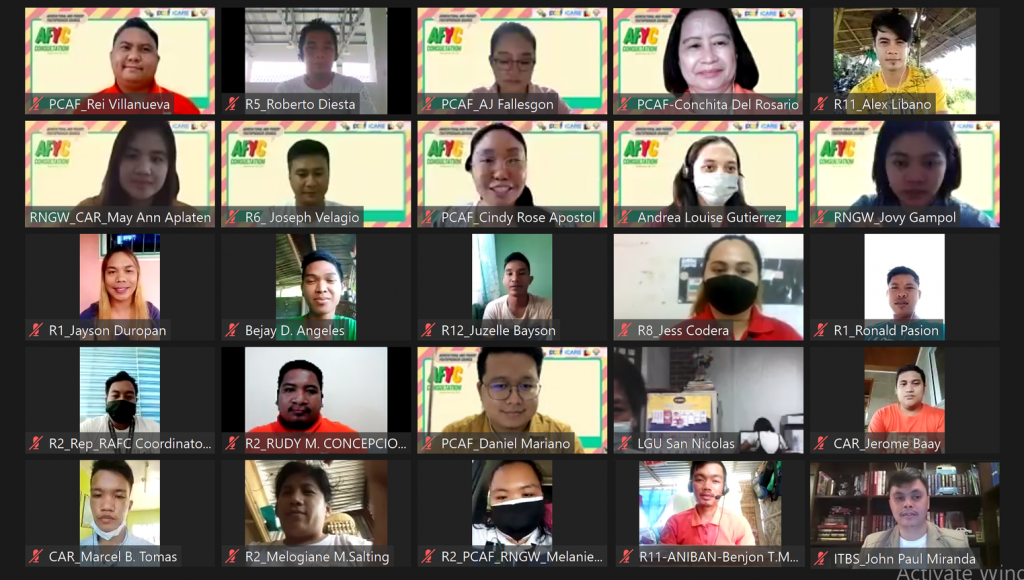
When Dr. Jose Rizal said that “the youth are our hope for the future,” he also referred to the new blood to succeed the experienced, aging Filipino farmers.
In a report revealed by the Department of Agriculture (DA), Filipino rice farmers’ mean age is 53 years old and young farmers should start engaging in the industry to incorporate new technologies and approaches in modern agriculture.
As the participatory arm of DA in transforming Philippine agriculture, the Philippine Council for Agriculture and Fisheries (PCAF) conducted its first Agricultural and Fishery Youthpreneur Council (AFYC) online cluster consultations on September 30, 2021, to engage the youth in meaningful discussions concerning agriculture and fisheries.
The event ensured that the voices of the youth were heard and actively involved them in agricultural and fishery projects, activities, and programs. The AFYC also served as a venue for the participation of the youth to identify and formulate sound, responsive, and innovative policy recommendations, influence the agriculture and fishery policy development agenda as the youth advisory special body.
It has also kicked off the institutionalization of the involvement of AFYC members in the Executive and Sectoral Committees at the Regional Agricultural and Fishery Council (AFC) level, and opened more opportunities for the youth as envisioned in the food secured Philippines with empowered prosperous farmers and fisherfolk amidst the COVID-19 pandemic.
The AFYC is also part of PCAF’s effort to make the AFC a vibrant and diverse nationwide network of private sector stakeholders and in support of DA’s OneDA Reform Agenda particularly in the area of youth & women engagement.
The breakout session during the event served as a melting pot of ideas and provided a venue where the youth leaders in agriculture were able to express their innovative ideas to push for the reforms in Philippine agriculture that they would like to see.
Youthpreneurs from the Luzon, Visayas, and Mindanao Clusters presented their suggested actions and resolutions on pressing matters in their respective areas.
The Luzon cluster suggested actions and resolutions on intensifying the information dissemination on the agri-fishery programs and projects funded by the government.
The youth also suggested strengthening capacity development training, intensified data gathering to avoid one size fits all approach, addressing gender disparity, and opening access to land for the youth. They also proposed to maximize youth involvement in policy formulation and decision making, simplifying and digitizing processing of loan applications for the youth, and additional funding towards learning sites for the youth.
For the Visayas cluster, they suggested solutions on the integration of Gender and Development (GAD) in youth activities and training. Particularly, they prefer specialized training for different agriculture-related applications, and intensify youth involvement in agriculture programs.
The Mindanao cluster seeked for the establishment of a one-stop Kadiwa Hub that will provide assistance to farmers on value-adding and processing as well as market linking in strategic areas, open additional online platforms for marketing and selling agri products, AFYC badge to promote agripreneur sellers on Kadiwa ni Ani at Kita shops, and additional loan programs for the youth.
These policy recommendations and solutions were made possible with the help of interesting and timely topics prepared by PCAF backed by competent resource speakers.
OIC Chief of Market Development Division of DA Agribusiness and Marketing Assistance Service (AMAS) Joyce Bengo discussed the KADIWA ni Ani at Kita Program- a direct marketing scheme of DA where producers are directly linked with the consumers, eliminating the middlemen and thus providing consumers with quality and affordable agricultural commodities.
DA AMAS’ Maricris Locquiao also presented DA’s Young Farmers Challenge Program- a contest for the youth aged 18-30 years old who will engage in agri-fishery based enterprises. The challenge encourages the youth to propose innovative agri-business ventures with viability. The program awards winners with cash prizes for start-up capital.
One of the key strategies in the OneDA Reform Agenda is Technology and Innovation including Digital Agriculture. Technology in agriculture has also made major strides to increase the efficiency and productivity of the farmers while providing them real-time updates on factors that might affect their farms such as weather forecasts and helping Local Government Units (LGUs).
Information Technology Business Solutions (ITBS) founder and Chief Executive Officer (CEO) John Paul Miranda gave a sneak peek at the future of Philippine agriculture through his presentation that highlights modern and innovative technologies aimed at making the farmers’ day to day tasks easier, through Agribot.
AGREA President and CEO Cherrie Atilano presented youthpreneurship challenges and opportunities in the new normal. She highlighted the importance of maintaining the dignity of our farmers by enabling them to be drivers of change for their families, communities, and the country.
OIC Chief of PCAF’s Partnership Development Division, Capacity Development Section Engr. Reynaldo Villanueva discussed the Civil Society Organization (CSO) accreditation. He mentioned that a policy recommendation can be proposed to the DA on how youthpreneurs can be co-implementers of DA’s projects and programs considering that they are still developing organizations that may not yet qualify given all the requirements for CSO accreditation.
PCAF OIC Executive Director, Dr. Liza Battad urged the participants to share the knowledge that they have acquired to attract fellow youth leaders to engage in agriculture. She also highlighted the importance of the youth in achieving DA’s twin goals of masaganang ani at mataas na kita. “Youth is not only the future but also the present,” she added. | CCB











